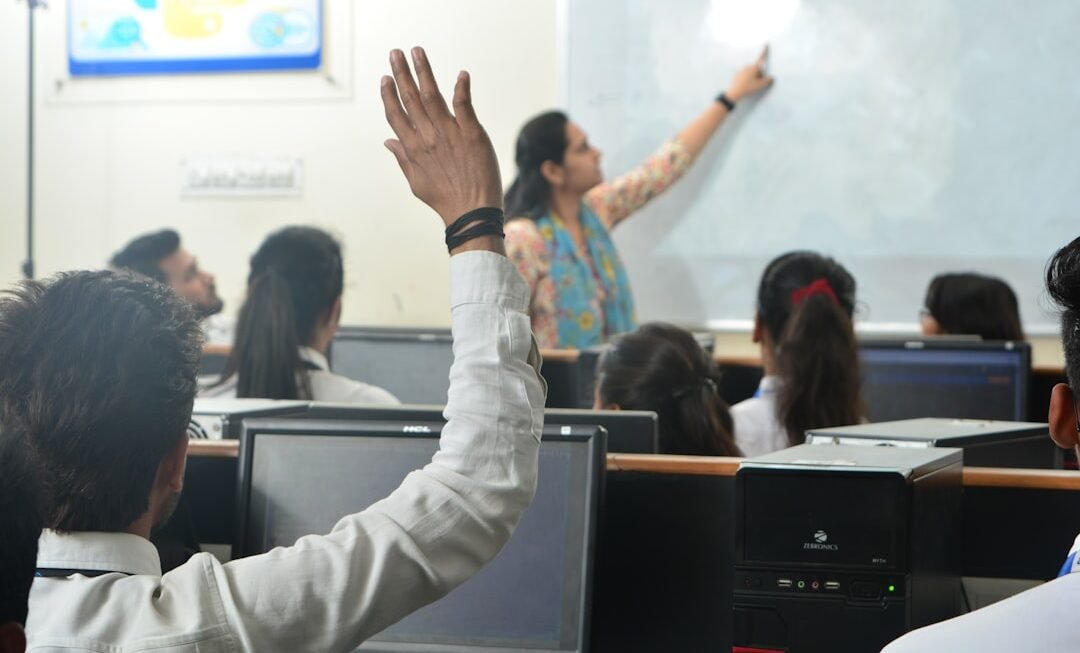The landscape of education has undergone a seismic shift with the advent of online teaching, a trend that has accelerated dramatically in recent years. Initially spurred by technological advancements, the rise of online education has been further catalyzed by global events such as the COVID-19 pandemic, which forced educational institutions to pivot rapidly to remote learning. This transition has not only made education more accessible to a broader audience but has also introduced new methodologies and pedagogical approaches that challenge traditional classroom dynamics.
As a result, online teaching has emerged as a viable alternative to conventional education, offering flexibility and convenience for both educators and learners. The proliferation of online teaching platforms has democratized access to quality education, allowing students from diverse backgrounds to engage with content that was previously out of reach. Institutions like Coursera, edX, and Khan Academy have made it possible for learners to access courses from prestigious universities and experts worldwide.
This shift has also encouraged lifelong learning, as individuals can now pursue professional development or personal interests at their own pace. The rise of online teaching is not merely a response to necessity; it represents a fundamental transformation in how knowledge is disseminated and acquired in the 21st century.
Key Takeaways
- Online teaching has seen a significant rise in recent years, especially due to the COVID-19 pandemic.
- Specialized teacher training is essential for educators to effectively navigate the online teaching landscape.
- Technology plays a crucial role in transforming and enhancing the education experience for both teachers and students.
- Traditional teaching methods need to be adapted to suit the requirements of online learning environments.
- Pedagogy is of utmost importance in online teaching to ensure effective learning outcomes for students.
The Need for Specialized Teacher Training
As online teaching becomes increasingly prevalent, the demand for specialized teacher training has never been more critical. Traditional teacher preparation programs often do not equip educators with the necessary skills to thrive in a digital environment. Online teaching requires a unique set of competencies, including proficiency in digital tools, an understanding of online pedagogy, and the ability to foster engagement in a virtual setting.
Consequently, educational institutions must prioritize the development of targeted training programs that address these specific needs. Moreover, specialized training can help educators navigate the complexities of online assessment and feedback mechanisms. In a virtual classroom, traditional methods of evaluation may not be effective or appropriate.
Educators must learn to utilize various digital assessment tools that provide real-time feedback and foster student accountability. By investing in specialized teacher training, institutions can ensure that educators are well-prepared to meet the challenges of online teaching and can deliver high-quality educational experiences that resonate with students.
The Role of Technology in Education
Technology plays a pivotal role in shaping the future of education, particularly in the realm of online teaching. The integration of various digital tools and platforms has transformed how educators deliver content and interact with students. Learning Management Systems (LMS) such as Moodle and Canvas facilitate course organization, while video conferencing tools like Zoom and Microsoft Teams enable real-time interaction between teachers and students.
These technologies not only enhance communication but also provide opportunities for collaborative learning experiences that transcend geographical boundaries. Furthermore, technology allows for the incorporation of multimedia resources that can enrich the learning experience. Educators can leverage videos, podcasts, interactive simulations, and gamified content to cater to diverse learning styles and preferences.
This multifaceted approach not only keeps students engaged but also promotes deeper understanding by allowing learners to explore concepts through various lenses. As technology continues to evolve, its role in education will likely expand, offering even more innovative solutions to enhance teaching and learning.
Adapting Traditional Teaching Methods for Online Learning
Adapting traditional teaching methods for online learning is essential for maintaining educational effectiveness in a digital environment. While some pedagogical strategies may translate well to an online format, others require significant modification to suit the unique characteristics of virtual classrooms. For instance, direct instruction may need to be supplemented with interactive elements such as breakout discussions or polls to keep students engaged during synchronous sessions.
Additionally, educators must consider the asynchronous nature of many online courses when designing their curricula. Traditional lecture-based approaches may not be as effective when students are learning independently at their own pace. Instead, educators should focus on creating modular content that allows learners to progress through material incrementally while incorporating opportunities for reflection and application.
By thoughtfully adapting traditional methods, educators can create a more dynamic and responsive online learning environment that meets the needs of diverse learners.
The Importance of Pedagogy in Online Teaching
Pedagogy is at the heart of effective online teaching, guiding educators in their approach to curriculum design, instruction, and assessment. A solid understanding of pedagogical principles is crucial for creating meaningful learning experiences that resonate with students in a virtual setting. Educators must be adept at employing various instructional strategies that promote active learning, critical thinking, and collaboration among students.
In an online context, pedagogical approaches such as constructivism and experiential learning can be particularly effective. Constructivist strategies encourage students to build their understanding through exploration and interaction with peers, while experiential learning emphasizes real-world applications of knowledge. By integrating these pedagogical frameworks into their online courses, educators can foster a sense of community and engagement that enhances student motivation and achievement.
Developing Digital Literacy Skills for Educators
As online teaching becomes more prevalent, developing digital literacy skills among educators is essential for success in the digital classroom. Digital literacy encompasses a range of competencies, including the ability to effectively use technology for communication, collaboration, and information management.
Moreover, digital literacy extends beyond technical skills; it also involves critical thinking and ethical considerations related to technology use. Educators must be equipped to guide students in evaluating online resources critically and understanding issues such as digital citizenship and online safety. By prioritizing digital literacy training for educators, institutions can ensure that teachers are not only competent users of technology but also effective facilitators of digital learning experiences.
Creating Engaging and Interactive Online Learning Environments
Creating engaging and interactive online learning environments is crucial for fostering student motivation and participation. In a virtual setting, educators must employ various strategies to capture students’ attention and encourage active involvement in their learning process. This can include incorporating multimedia elements such as videos, infographics, and interactive simulations that appeal to different learning styles.
Additionally, fostering a sense of community is vital for engagement in online courses. Educators can achieve this by facilitating discussions through forums or chat rooms where students can share ideas and collaborate on projects. Incorporating gamification elements—such as leaderboards or badges—can also enhance motivation by providing students with tangible rewards for their efforts.
By prioritizing engagement and interactivity in their course design, educators can create vibrant online learning environments that promote student success.
Understanding the Challenges of Online Teaching
Despite its many advantages, online teaching presents several challenges that educators must navigate effectively. One significant hurdle is the potential for decreased student engagement due to the lack of face-to-face interaction. In traditional classrooms, non-verbal cues such as body language play a crucial role in communication; however, these cues are often diminished in virtual settings.
Educators must find innovative ways to foster connection and engagement among students to mitigate this challenge. Another challenge lies in addressing the diverse needs of learners in an online environment. Students come from various backgrounds and possess different levels of technological proficiency; thus, educators must be prepared to provide differentiated support tailored to individual needs.
This may involve offering additional resources or alternative assignments for students who require extra assistance or adapting course materials to accommodate varying levels of understanding. By recognizing these challenges and proactively addressing them, educators can create more inclusive and effective online learning experiences.
Incorporating Social and Emotional Learning in Online Education
Incorporating social and emotional learning (SEL) into online education is essential for supporting students’ holistic development. SEL focuses on fostering skills such as self-awareness, empathy, relationship-building, and responsible decision-making—skills that are particularly important in an increasingly digital world. Educators can integrate SEL into their online courses by creating opportunities for students to reflect on their emotions and experiences while encouraging collaboration and peer support.
For instance, educators might implement activities that promote self-reflection or group discussions centered around emotional well-being. Additionally, providing resources related to mental health and wellness can help students navigate the challenges they may face while learning remotely. By prioritizing SEL in online education, educators can cultivate a supportive environment that nurtures both academic success and personal growth.
The Future of Professional Development for Online Educators
The future of professional development for online educators is poised for transformation as the demand for skilled instructors continues to grow. Traditional models of professional development often fall short in addressing the unique challenges associated with online teaching; therefore, there is a pressing need for innovative approaches that prioritize ongoing training and support tailored specifically for virtual environments. One promising avenue is the development of collaborative professional learning communities where educators can share best practices, resources, and experiences related to online teaching.
These communities can foster a culture of continuous improvement while providing opportunities for mentorship and peer feedback. Additionally, institutions may explore partnerships with technology companies or educational organizations to offer specialized training programs focused on emerging trends in online education.
The Impact of Online Teaching on Student Success
The impact of online teaching on student success is multifaceted and continues to be a subject of extensive research and discussion within educational circles. While some studies suggest that online learning can lead to improved outcomes due to its flexibility and accessibility, others highlight potential drawbacks such as increased feelings of isolation among students or challenges related to self-regulation. Ultimately, the effectiveness of online teaching hinges on various factors including course design, educator proficiency, student engagement levels, and institutional support systems.
When implemented thoughtfully with a focus on best practices—such as fostering interaction, providing timely feedback, and incorporating diverse instructional strategies—online education has the potential to enhance student success significantly. As educational institutions continue to refine their approaches to online teaching, understanding its impact on student outcomes will remain a critical area of focus for educators and policymakers alike.












